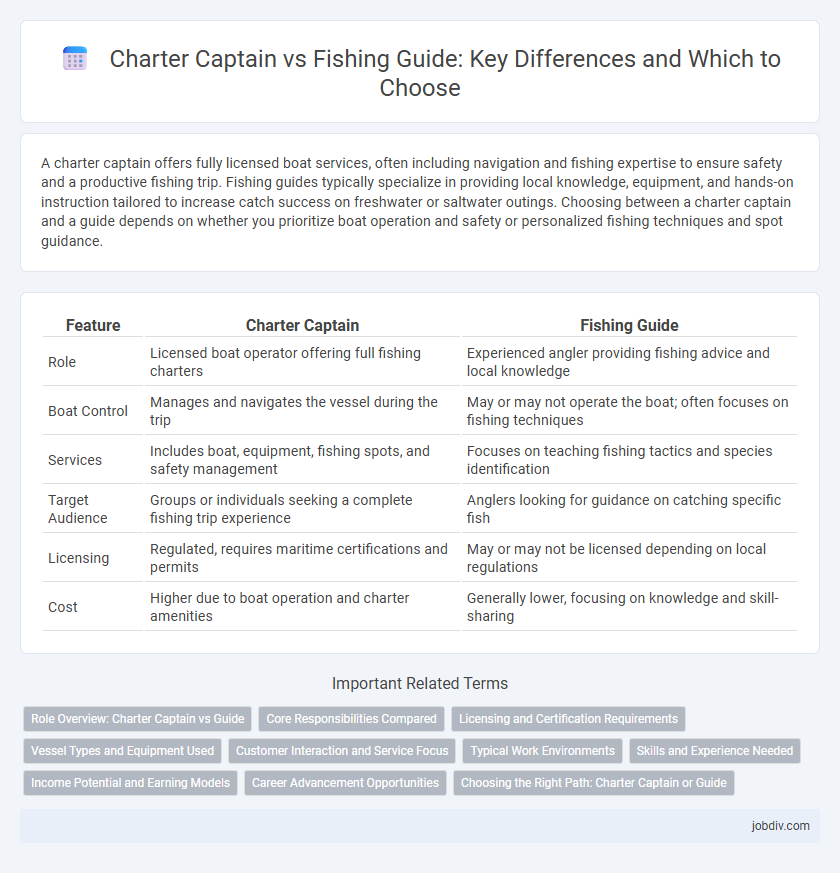A charter captain offers fully licensed boat services, often including navigation and fishing expertise to ensure safety and a productive fishing trip. Fishing guides typically specialize in providing local knowledge, equipment, and hands-on instruction tailored to increase catch success on freshwater or saltwater outings. Choosing between a charter captain and a guide depends on whether you prioritize boat operation and safety or personalized fishing techniques and spot guidance.
Table of Comparison
| Feature | Charter Captain | Fishing Guide |
|---|---|---|
| Role | Licensed boat operator offering full fishing charters | Experienced angler providing fishing advice and local knowledge |
| Boat Control | Manages and navigates the vessel during the trip | May or may not operate the boat; often focuses on fishing techniques |
| Services | Includes boat, equipment, fishing spots, and safety management | Focuses on teaching fishing tactics and species identification |
| Target Audience | Groups or individuals seeking a complete fishing trip experience | Anglers looking for guidance on catching specific fish |
| Licensing | Regulated, requires maritime certifications and permits | May or may not be licensed depending on local regulations |
| Cost | Higher due to boat operation and charter amenities | Generally lower, focusing on knowledge and skill-sharing |
Role Overview: Charter Captain vs Guide
A charter captain is typically responsible for operating the boat, ensuring navigational safety, and managing all aspects of the fishing trip, including customer experience and compliance with maritime regulations. In contrast, a fishing guide primarily focuses on providing expert fishing techniques, locating prime fishing spots, and offering personalized tips to enhance catch success. Both roles require extensive knowledge of local waters, but the charter captain's duties extend to vessel operation and trip logistics, whereas the guide specializes in angling expertise and fish behavior.
Core Responsibilities Compared
A charter captain oversees the entire fishing trip, ensuring vessel safety, navigation, and compliance with maritime regulations while providing expert fishing knowledge. A fishing guide primarily focuses on assisting clients with fishing techniques, spotting fish, and improving catch rates, often on smaller watercraft. Both roles require extensive experience, but captains are responsible for trip logistics and safety, whereas guides concentrate on enhancing the angler's fishing experience.
Licensing and Certification Requirements
Charter captains typically require a U.S. Coast Guard Master Captain's License due to their role in operating commercial fishing vessels and ensuring passenger safety, while fishing guides often need state-specific licenses or permits tailored to guiding recreational anglers. Certification for charter captains includes advanced training in navigation, vessel operation, and emergency procedures, whereas guides focus more on local knowledge, fishing regulations, and angler assistance. Both professionals must adhere to fishing regulations, but licensing requirements vary significantly based on jurisdiction and the scope of their commercial activities.
Vessel Types and Equipment Used
Charter captains typically operate larger vessels equipped with advanced navigation systems, fish finders, and multiple rod holders designed for group fishing experiences. Guides usually use smaller boats like skiffs or bass boats, outfitted with shallow-water electronics, trolling motors, and essential gear for personalized, skill-focused trips. Vessel type and equipment selection directly influence the fishing style, targeting methods, and species accessibility in various water conditions.
Customer Interaction and Service Focus
Charter captains prioritize creating a comprehensive fishing experience, handling boat operations and navigation while engaging customers with detailed knowledge about fishing spots and techniques. Guides specialize in personalized instruction and support, focusing on teaching fishing methods and ensuring customer comfort throughout the trip. Both roles emphasize customer interaction, but captains balance technical skills with hospitality, whereas guides concentrate more on hands-on guidance and one-on-one service.
Typical Work Environments
Charter captains typically operate larger boats in coastal or offshore waters, providing full-day or half-day fishing trips for multiple clients. Guides often work on smaller vessels in freshwater locations such as rivers, lakes, and streams, offering personalized, intimate fishing experiences. Both roles require in-depth knowledge of local fish species, water conditions, and safety protocols specific to their environments.
Skills and Experience Needed
A Charter Captain must hold a valid captain's license, demonstrate extensive navigation skills, and possess comprehensive knowledge of maritime safety regulations to ensure passenger safety. In contrast, a Fishing Guide requires deep expertise in local fish behavior, effective fishing techniques, and the ability to read water conditions to enhance the angling experience. Both roles demand strong communication skills and proficiency in handling fishing equipment, but the captain's focus leans more toward vessel operation, while the guide emphasizes angler success and education.
Income Potential and Earning Models
Charter captains typically generate higher income potential through full-day trips and group bookings, operating primarily on fixed-rate models or per-person fees. Guides often earn income based on hourly rates or a percentage of client tips, which may result in variable earnings depending on client frequency and season. Understanding the nuances of these earning models is crucial for maximizing revenue in the fishing industry.
Career Advancement Opportunities
Charter captains often experience greater career advancement opportunities through ownership of their own boats and businesses, allowing increased income potential and industry reputation growth. Fishing guides typically gain hands-on experience on diverse waterways, which can lead to certifications and specialization in niche fishing techniques. Both roles offer pathways to leadership positions within fishing lodges, resorts, or tourism companies, but captains generally have broader entrepreneurial prospects.
Choosing the Right Path: Charter Captain or Guide
Choosing the right path between a charter captain and a fishing guide depends on your fishing goals and experience level. A charter captain typically operates larger boats, offers customized fishing trips, and holds commercial licenses for offshore excursions, ideal for serious anglers seeking full-service experiences. Fishing guides focus on local waters, provide hands-on instruction, and specialize in specific techniques or species, making them perfect for beginners or those looking to improve skills in freshwater or inshore environments.
Charter Captain vs Guide Infographic

 jobdiv.com
jobdiv.com